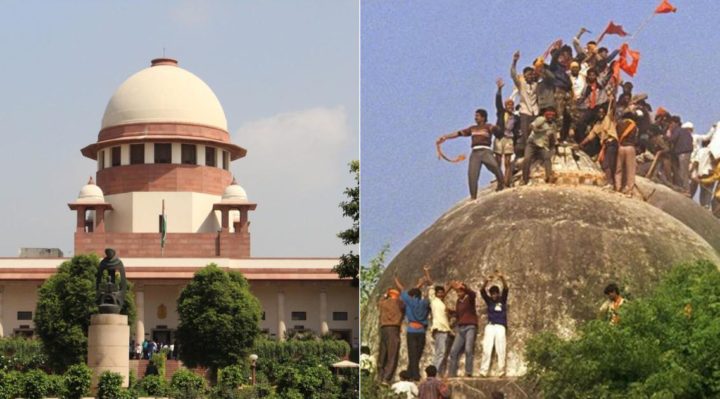Hon’ble Supreme Court has pronounced Judgment on 9th November, 2019 in matter of Ayodhya Ram Mandir-Babjri Masjid Case i.e, M.SIDDIQ (D) THR. LRS. VS. MAHANT SURESH DAS & ORS. and Connected Matters.
A Constitution Bench comprising of CJI Ranjan Gogoi, Justice SA Bobde, Justice DY Chandrachud, Justice Ashok Bhushan and Justice Abdul Nazeer on November 9 has delivered its judgment in the cross-appeals filed by the Hindu and Muslim sides challenging the three-way partition of the disputed 2.77 acres of Ramjanmabhoomi-Babri Masjid land among Ram Lalla, Nirmohi Akhara and the Sunni Waqf Board in September 2010.

In a unanimous judgment, the Bench has ordered that a temple must be constructed at the disputed site and the Muslims must be compensated with five acres of land at a prominent place in Ayodhya. The court also ordered the Central government to formulate a scheme within three months to implement this order.
Quoting the ASI report, the Bench says theunderlying structure in the disputed site was not of Islamic origin, however the report does not support whether the temple was demolished, the Bench says.
The court also says the mosque was not built on a vacant land, as claimed by the Muslim parties. There is clear evidence the Hindus believed Ram was born in the disputed site, the CJI say. There is evidence that Ram Chabutra and Sita Rasoi was worshipped by the Hindus even before the British came. However, travelogues and gazetteers cannot be the basis of adjudication of title, the Bench says.
The mosque was neither abandoned nor seceded by the Muslims, the court observes. However, the court says the Muslims could not prove exclusive possession of the property.
The main points of the judgment are as follows:
(i) In one of the most important judgements in India’s history, a 5-Member Bench headed by Chief Justice Ranjan Gogoi unanimously put an end to more than a century old dispute that has torn the social fabric of the nation.
(ii) Judgment is based on law and not on faith;
(iii) Judgment took into account archaeological evidence from the site, presented by Archaeological Survey of India (ASI), which establishes that a pre-existing structure that was not Islamic underlies the disputed structure. The judgment ruled that ASI credentials are beyond doubt. The Supreme Court of India gave the verdict on the basis of multiple pieces of evidence including inter alia i) report of survey and excavation on the site carried out by ASI; ii) historical records including pre-colonial travellers’ accounts and government records from the British colonial period; and iii) the evidence and material presented by all claimants to the Title Suit through the prolonged judicial process since the Independence of India;
(iv) The Title is in favour of Ram Lalla Deity. The court held that Ram Lalla Deity is a juristic entity in accordance with Indian law. The property will be handed over to a Trust, formed by the Centre within three months, which will build the Temple; and
(v) An alternate 5-acres land will be allotted to the Sunni Waqf Boardfor construction of a Mosque in Ayodhya.
3. Prime Minister of India Shri Narendra Modi addressed the nation over the verdict, stating that there is no space for negativity, bitterness and fear in new India. He also praised the country’s judicial system for its willpower and hailed the verdict highlighting that it had amicably ended the decades-old dispute. PM Modi called for peace and harmony in the country adding that the verdict should not be seen as a win or loss for anybody.
